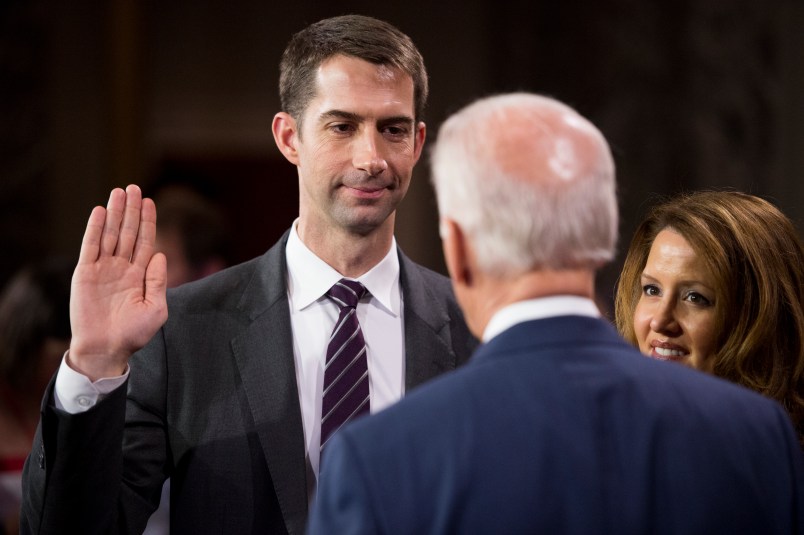WASHINGTON — A letter from 47 Republican senators to Iran warning that any deal with the U.S. regarding its nuclear program could be short-lived has endangered GOP hopes of securing a veto-proof majority for legislation to ensure that Congress signs off on any agreement.
In a sign that the gambit is backfiring, numerous Senate Democrats who have sided with Republicans and against President Barack Obama on the issue of Iran have harshly condemned their GOP colleagues over the letter, on which freshman Sen. Tom Cotton (R-AR) took the lead.
The Iran Nuclear Agreement Review Act, led by Sens. Bob Corker (R-TN) and Bob Menendez (D-NJ), respectively the chairman and ranking member of the Foreign Relations Committee, would ensure congressional review of any deal with Iran before sanctions can be removed.
It enjoys the support of seven members of the Democratic caucus. Three of those senators — Bill Nelson (D-FL), Tim Kaine (D-VA) and Angus King (I-ME) — fiercely criticized the Republican letter. Kaine said earlier this week that the GOP letter raised questions about whether Congress is “mature” enough to deal with national security.
“It has cast a serious pal over an issue that has traditionally been bipartisan. This letter clouds what was already an uncertain outlook for Corker-Menendez,” said a Democratic aide to a senator who supports legislation to ensure Congress signs off on any nuclear deal with Iran.
A separate bill, the Nuclear Weapon Free Iran Act, sponsored by Sen. Mark Kirk (R-IL), would restrict the president’s ability to waive sanctions on Iran, a key component of the U.S.-Iran negotiations. It currently enjoys the support of 51 senators, including eight Democrats.
One of those Democrats, Sen. Bob Casey (PA), fiercely criticized the GOP letter.
“This is a misguided and reckless attempt to circumvent a sitting U.S. President by going directly to the leader of the Iranian regime – a longtime adversary of the United States,” Casey said. “It is clear that many Americans find it offensive. I’ve spent years working to prevent Iran from obtaining nuclear weapon capability and no one has been tougher on this issue than I. We should be focusing on bipartisan policy, not engaging in partisan theatrics.”
Obama has signaled he’ll veto the bills, warning that they would scuttle an agreement with Iran before one can be reached. (He blasted the letter as a GOP attempt to make “common cause” with Iran’s hardliners.) As a result, the bills would need a veto-proof majority of 67 senators.
Corker, one of seven Republicans who declined to sign the letter, recognized that it may set back his cause, expressing surprise at the momentum it gained.
“I immediately knew that it was not something that, for me anyway, in my particular role, was going to be constructive,” he said this week. “I did not think the letter was something that was going to help get us to an outcome.”
It’s unclear what impact the letter will ultimately have. Supporters of a nuclear deal worry it will embolden Iran’s hardliners by creating the impression that the U.S. cannot be trusted to honor an agreement, which the Obama administration is reportedly closing in on. But it also appears to have set back the cause of ensuring a robust congressional role in the approval of a deal.







Again and again, this particular version of the GOP demonstrates that they cannot think strategically to further their own interests. (I’m setting aside for the moment the larger, if snarkier, question of whether they’re thinking, period.) Usually, when they attempt to appeal to (read: appease) the base, they can’t seem to think beyond the next election cycle, thus endangering their own long-term health as a party. In this instance, though, they do seem to be thinking ever-so-slightly beyond November 2016 . . . but now, they’re endangering what little shot at bipartisanship they had on this issue (which, you know, I’m glad for, as far as this issue is concerned).
At the heart of all these political (and, in this case, policy) screw-ups is that Republicans have opted for obstruction as their default mode rather than governance on domestic policy or counsel on foreign policy. Obstruction is easier than thinking; but so far, they have precious little to show for not thinking–aside, that is, from not getting legislation signed that Obama will sign into law or that has veto-proof support.
Let’s suppose that the 5 + 1 and Iran reach a deal and then Congress were to pass a bill forbidding the lifting of sanctions and then over-rode a veto (a long shot in the Senate and a very long shot in the House, since Pelosi is not on board). What would happen? The other 5 would lift sanctions, while the US would keep them. The effect of that? Iran would sell oil to China, bank the profits in Europe and buy what it needs anywhere except the US. Who would that hurt? US businesses, but certainly not Iran. It would be like the highly effective Cuban embargo, except Iran is next to Russia and China and near Europe and thus much less interested in trading with the US than Cuba is.
Truly dumb and dumber and dumbest.
This letter should hurt Republicans by reminding the country what traitors they are. If treason isn’t a disadvantage to politicians any more, then we’re all doomed regardless of Iran.
I’d love to know how freshman Tom Cotton, two months into his first term, managed to get veterans like Grassley and others to go along with it.
The Koch choke?